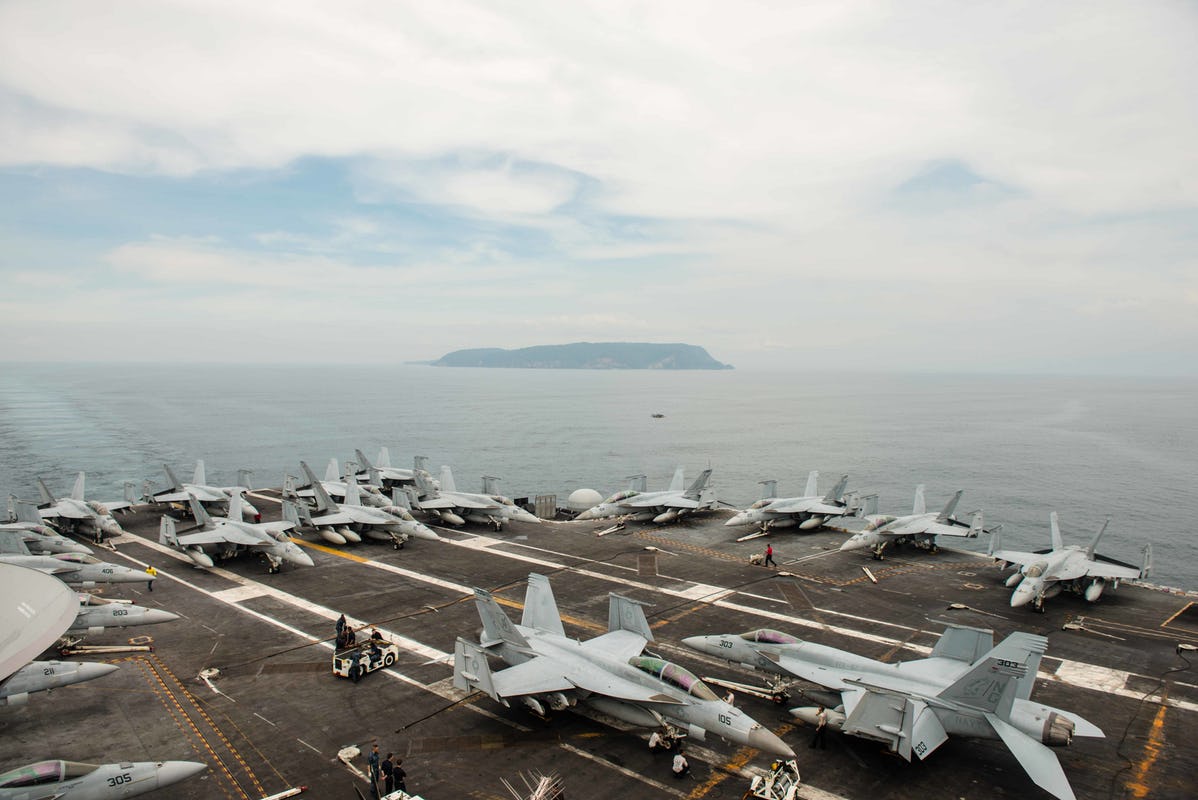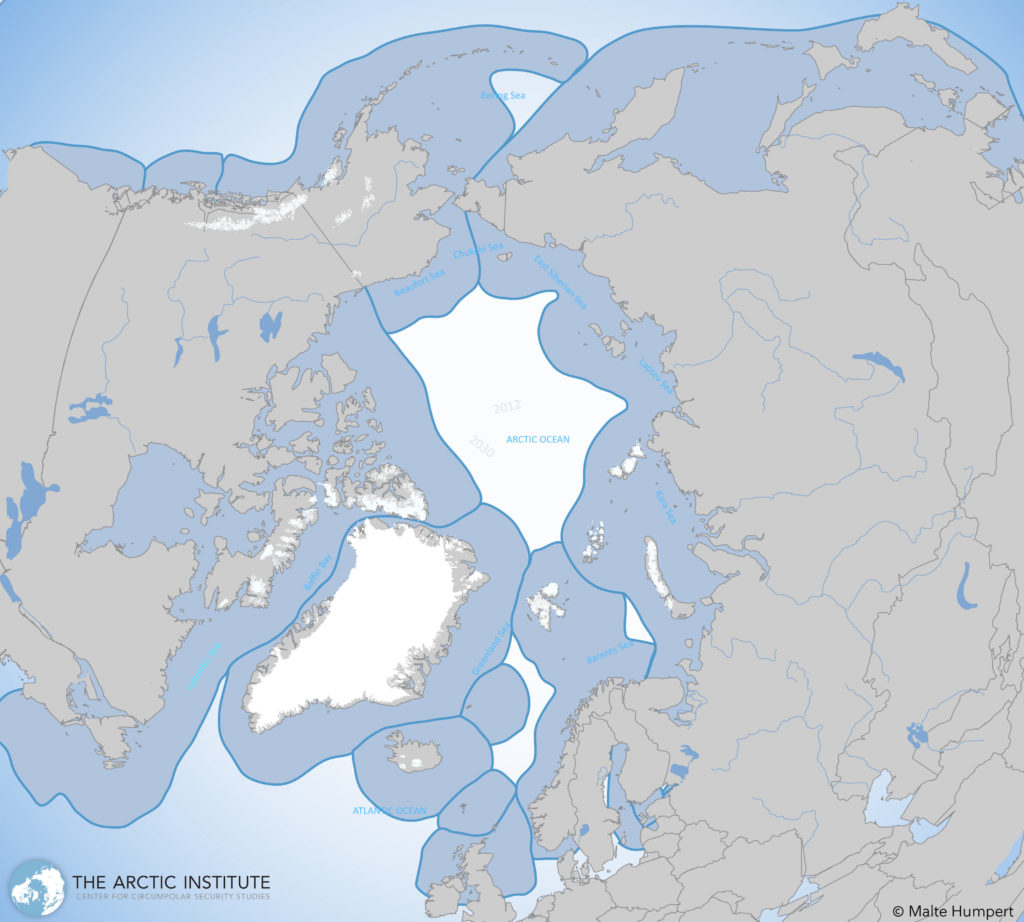A Sea of Conflict? The Growing Obsession with Maritime Space

USS John C. Stennis (CVN 74) departs Manila, Philippines, after a port call. Photo: US Navy/DOD
Oceans are ascending in importance. Dormant maritime disputes are appearing on political agendas around the world. As we are entering a new era for maritime politics, the potential for conflict over maritime space is rising.
The maritime domain has historically proven less prone to conflict than the terrestrial. This can be traced back to a number of variables, including inability by humans to access and utilise ocean-space similar to that of land. Another key distinction, as codified in international law, is that the rights states have acquired vis-à-vis the ocean, are not equivalent to those states hold in respect of land.
These factors are being challenged by technological innovations such as subsea technology, states’ increasing preoccupation with maritime resources, and a more prominent role for maritime disputes as a symbolic issue in national politics. Rising sea levels—in tandem with changing a distribution of marine resources and a growing demand for the said resources—are leading to an increased focus on maritime space and rights.
Marine Resource Dependence
Despite the decline in oil and gas prices in 2014, global offshore petroleum resources are still likely to attract interest. This has led to many energy projects situated at high price points, or located in extreme conditions, being shuttered and the probability of new projects being approved is much lower than a decade ago, when the oil price was twice as high. Yet, even in environments like the Arctic, low-hanging fruits are still being pursued.
In addition to traditional energy resources, offshore wind farms are increasingly attracting global investment. The EU, for example, is planning to increase the share of offshore wind energy to more than 5 per cent of the total energy mix by 2030.
The global fishing industry is also growing in importance. World per capita fish consumption increased from an average of 9.9 kg in the 1960s to 14.4 kg in the 1990s and 19.7 kg in 2013, with preliminary estimates for 2014 and 2015 indicating further growth beyond 20 kg. By and large, humanity is experiencing a widespread reduction in the total biomass of marine resources, a development closely linked to human exploitative activities. According to the UN’s Food and Agriculture Organization (FAO), at least 32 percent of fish stocks are overexploited. As water temperature, currents, and fish stocks alter the distribution patters, conflicts over who gets to fish what are likely to increase.
Other ocean-based resources are attracting attention too; especially seabed minerals. Using ship-based extraction technology, Japan successfully mined metals from the seabed in 2017 for the first time, and anticipates large-scale commercialisation of several offshore deposits beginning in 2020. The potential for seabed mining—in tandem with new technological developments and increased demand for rare earth minerals to be used in high technological industries—will continue to direct focus towards maritime exploration and resource extraction.
And then there is Climate Change
Finally, the effects of climate change on the oceans are becoming increasingly apparent. Ocean acidification, the destruction of marine environments, and environmental issues (e.g. plastic pollution) have received widespread attention in the media and among politicians alike.
The Intergovernmental Panel on Climate Change has cautiously predicted that the sea level could rise by one meter by 2100. This would undoubtedly affect how states engage with and perceive the maritime domain, including the boundaries that determine where states’ have sovereign rights to resources. Since it is baselines along changing coasts from which boundaries are derived, states might be forced to revisit old and unresolved disputes, of which there are plenty.
Regarding the high seas, there are currently no international legal instruments to designate and manage marine protected areas. An implementing agreement currently being negotiated under the UN Convention on the Law of the Sea on the conservation and sustainable use of marine biological diversity of areas beyond national jurisdiction may provide such an instrument.
The Next Hot Topic
Exogenous and endogenous changes are thus visible in the oceans. Changes deriving from resource pressures, international commodity prices, and new technology are exogenous. Changes in the oceans due to climate change, rising sea levels, and changing resource distribution within the oceans are endogenous to the maritime realm, albeit a consequence of human behaviour to varying degrees.
In response to these changes, the United Nations has dedicated the period from 2021 to 2030 to ‘Ocean Science for Sustainable Development’. There has been an explosion in the number of related conferences and seminars attended by policy-makers and scientists around the world, or relevant projects looking at the potential for the ‘blue economy’, such as the recently launched AlaskaNor-project.
Take Norway, for example. The government has spent the last 13 years describing the Arctic as the “most important strategic area of interest”. Thus, as the world started seeing the oceans as the next big global challenge – cf. former Secretary of State Kerry’s 2016 ‘Our Ocean’ conference in Washington D.C. – the Norwegian government did not need asking twice. Prime Minister Solberg opened a new ‘Centre for the Arctic and the Ocean’ in Tromsø, North Norway, in mid-2018, and convened a so-called ‘High-Level Panel on Sustainable Ocean Economy’ under the UN with state leaders from around the world. Furthermore, Norway will be hosting the Our Ocean Conference in 2019.
Yet the ocean is not ‘new’. It has been essential to human survival and development for as long as there have been humans. What is new, however, is the recognition that for the first time in humanity’s history, we have the power (for good and bad) to drastically alter the oceans.
Rising Tension?
Attention to challenges such as plastic pollution and overfishing can undoubtedly be of benefit to all nations. At the same time, we see examples of disputes surfacing around the globe involving maritime space. These include overlapping continental shelf claims, the implementation of marine protected areas, the status of sea lanes, and the spatial distribution of transboundary fish stocks and sedentary species.
In the South China Sea, for example, disputes between China, Vietnam, the Philippines, Brunei, Taiwan, and Malaysia have escalated in recent years as power dynamics shift and marine resources become more valuable. Similarly, in the Arctic Ocean, the retreating sea ice and greater interest in the region have brought previously neglected maritime disputes in the north to the surface. These range from disagreements on where to delineate boundaries to how to allocate fish quotas as stocks are altering their patterns of movement. The processes of determining the continental shelf limits beyond 200 nautical miles around the world, as in the Arctic Ocean, are becoming increasingly relevant.
Both the Arctic and the South China Sea have been prone to oversimplification that focuses on the potential for conflict and “territorial grabs”. At the same time, what is fuelling some of the political attention to these maritime domains are precisely the changes described.

A New Era for Ocean Disputes
All these trends are leading to a new era for maritime issues and maritime space. Of importance here is the question of ‘who owns what’ in the maritime domain. States have rights and duties when it comes to maritime space, so delineating ownership and rights has become increasingly urgent in both domestic and international politics.
The world is not likely to erupt into physical hostilities over maritime rights, or over where to draw a maritime boundary. We are, however, witnessing the rise of maritime disputes on domestic agendas around the world, as global attention is centred on the oceans. Minor political and economic squabbles between states can have severe negative consequences for the immediate political climate, as well as for the ability of states and the international community to tackle some of the challenges – such as acidification or plastic pollution – appearing in the maritime domain.
States, as well as their domestic audiences, ought to be aware of these trends, and continue to support mechanisms that dampen the conflict potential in the maritime domain—whether through the UN Convention on the Law of the Sea, the International Court of Justice, or regional organisations focused on ocean governance. Given the centrality of oceans and our dependence on them, long-term thinking should outweigh short-term profit seeking.
As put by the British science fiction writer Arthur C. Clarke: “how inappropriate to call this planet Earth, when clearly it is Ocean”. The trends outlined here might prompt a further recognition of this fact, at a time when oceans are rapidly changing.